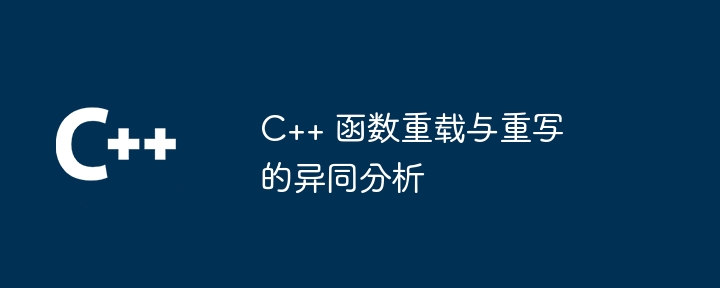Home >Backend Development >C++ >Analysis of similarities and differences between C++ function overloading and rewriting
Analysis of similarities and differences between C++ function overloading and rewriting
- WBOYWBOYWBOYWBOYWBOYWBOYWBOYWBOYWBOYWBOYWBOYWBOYWBOriginal
- 2024-04-21 08:27:011340browse
Similarities and differences between function overloading and rewriting: Similarities: Provide multiple sets of variants of functions, and name reuse simplifies code. The difference: scope: overloading is in the same scope, and overriding is in different scopes. Parameter or return type: Overloaded parameter types are different, and overriding allows different parameter types or return types. Purpose: Overload extension functions, override customization or override parent class methods.

Analysis of similarities and differences between C function overloading and rewriting
Function overloading
- Definition: Multiple functions with the same name but different parameter types.
-
Features:
- Different parameter types enable multiple sets of variations of the same function.
- Occurs within the same scope.
- Code example:
#include <iostream>
using namespace std;
// 求面积函数,重载为正方形和圆形
double area(double side) {
return side * side;
}
double area(double radius) {
return 3.14 * radius * radius;
}
int main() {
cout << "正方形面积: " << area(5) << endl;
cout << "圆形面积: " << area(3) << endl;
}Function override
- Definition: The function name defined in the subclass is the same as the parent class, but the parameter type or return type is different.
-
Features:
- Override the methods of the parent class and provide a unique implementation of the subclass.
- Occurs in a derived class, where the parent class and subclass are in different scopes.
- Code example:
#include <iostream>
using namespace std;
class Shape {
public:
virtual double area() {
return 0;
}
};
class Rectangle : public Shape {
public:
double height, width;
Rectangle(double height, double width) {
this->height = height;
this->width = width;
}
double area() override {
return height * width;
}
};
class Circle : public Shape {
public:
double radius;
Circle(double radius) {
this->radius = radius;
}
double area() override {
return 3.14 * radius * radius;
}
};
int main() {
Rectangle rectangle(5, 3);
Circle circle(3);
cout << "长方形面积: " << rectangle.area() << endl;
cout << "圆形面积: " << circle.area() << endl;
}Comparison of similarities and differences
Same points:
- can provide multiple sets of variants of functions.
- Use name reusability to simplify code.
Differences:
- Scope: Function overloading occurs within the same scope, while function overriding occurs In different scopes (parent class and child class).
- Parameter or return type: The parameter types of function overloading are different, while function overriding allows different parameter types or return types.
- Purpose: Function overloading is mainly used to extend existing functions, while function overriding is used to customize or override the methods of the parent class.
Practical Case
In GUI applications, controls often have the same function (such as setting text or background color), but different input parameters (such as string or color object ). In this case, function overloading can simplify the API and reduce code duplication.
In object-oriented applications, overriding can achieve polymorphism. Subclasses can provide different method implementations while maintaining the interface inherited from the parent class, thereby achieving code scalability and flexibility.
The above is the detailed content of Analysis of similarities and differences between C++ function overloading and rewriting. For more information, please follow other related articles on the PHP Chinese website!

